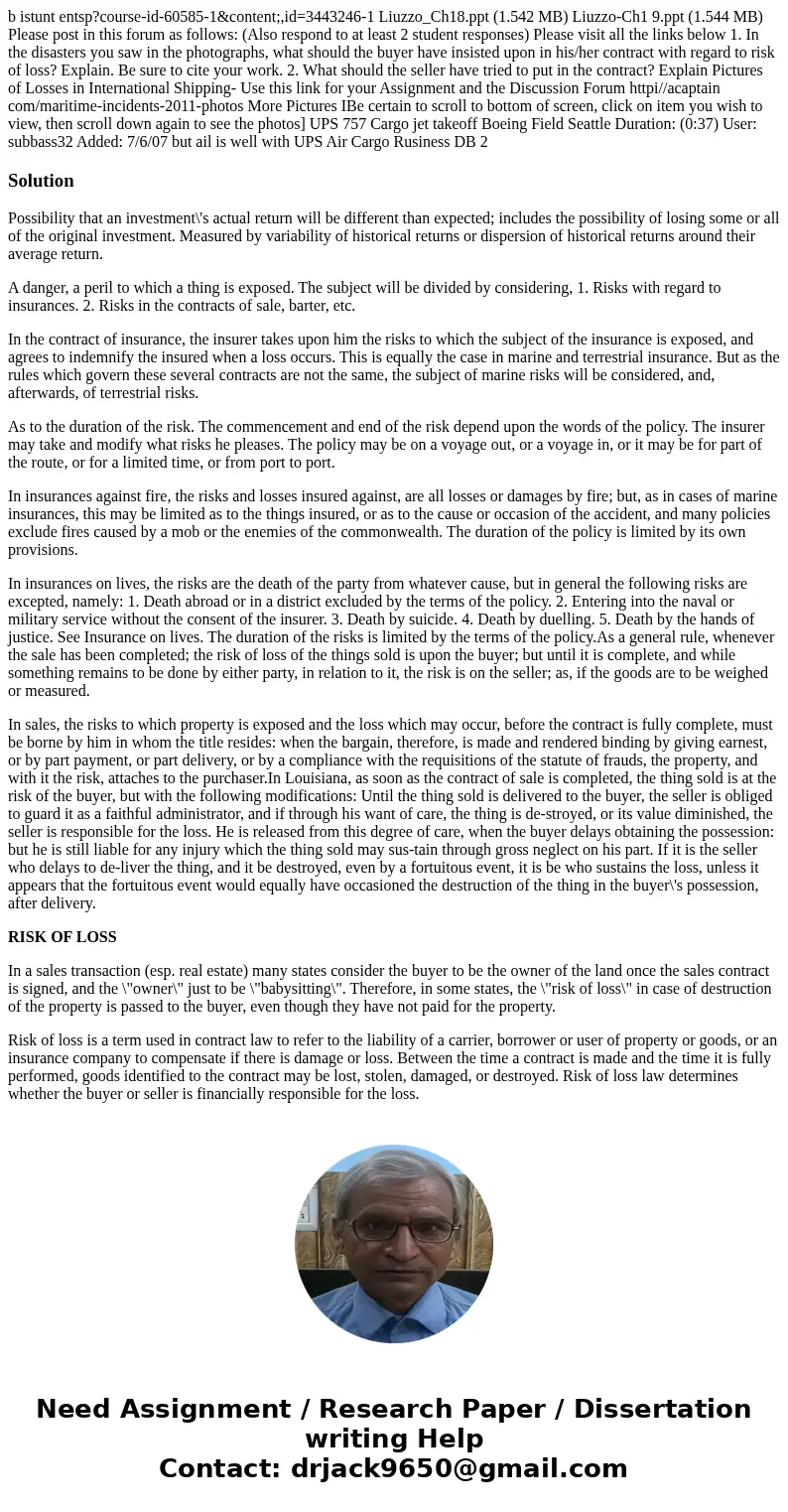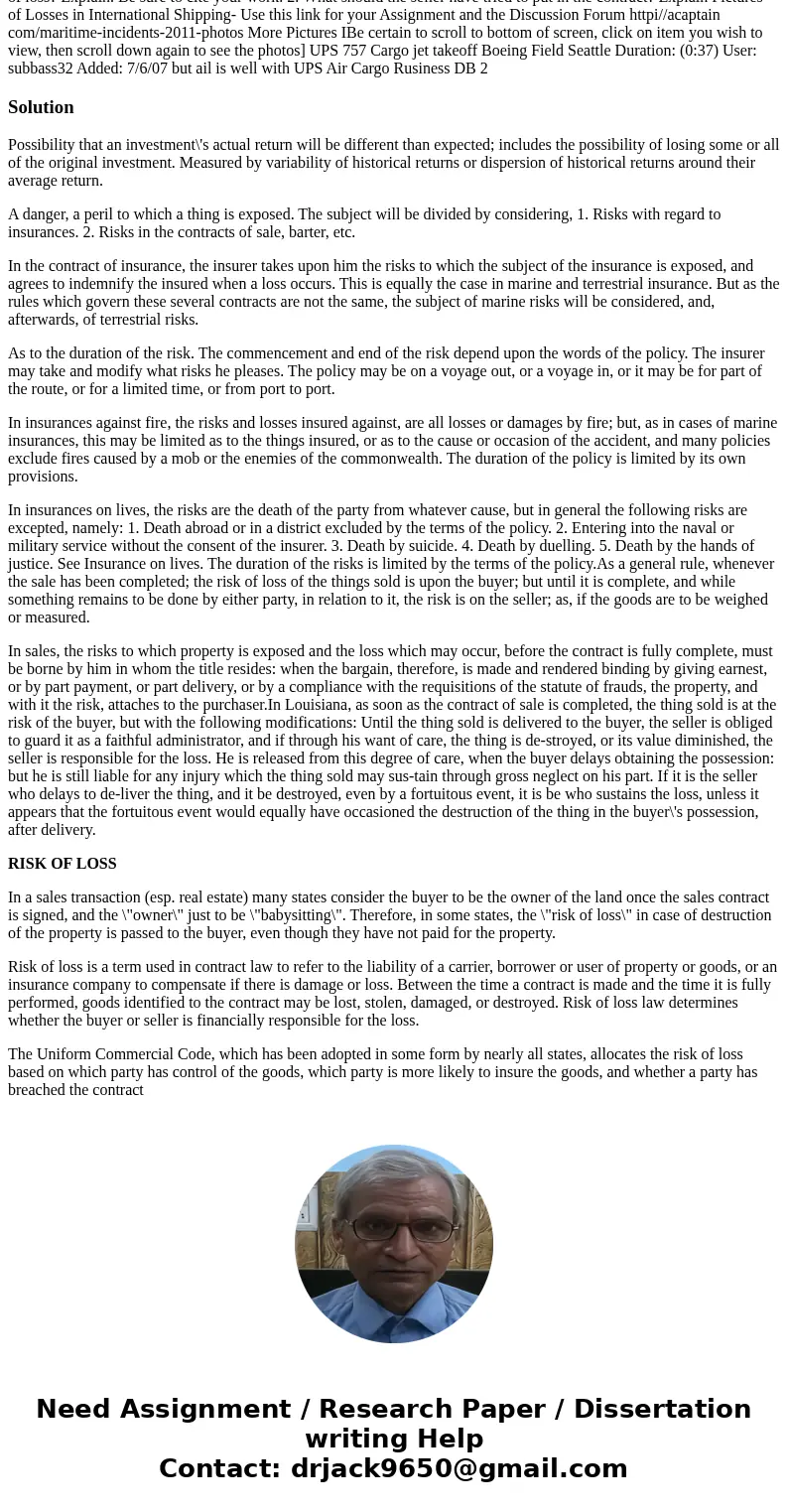b istunt entspcourseid605851contentid34432461 LiuzzoCh18ppt
Solution
Possibility that an investment\'s actual return will be different than expected; includes the possibility of losing some or all of the original investment. Measured by variability of historical returns or dispersion of historical returns around their average return.
A danger, a peril to which a thing is exposed. The subject will be divided by considering, 1. Risks with regard to insurances. 2. Risks in the contracts of sale, barter, etc.
In the contract of insurance, the insurer takes upon him the risks to which the subject of the insurance is exposed, and agrees to indemnify the insured when a loss occurs. This is equally the case in marine and terrestrial insurance. But as the rules which govern these several contracts are not the same, the subject of marine risks will be considered, and, afterwards, of terrestrial risks.
As to the duration of the risk. The commencement and end of the risk depend upon the words of the policy. The insurer may take and modify what risks he pleases. The policy may be on a voyage out, or a voyage in, or it may be for part of the route, or for a limited time, or from port to port.
In insurances against fire, the risks and losses insured against, are all losses or damages by fire; but, as in cases of marine insurances, this may be limited as to the things insured, or as to the cause or occasion of the accident, and many policies exclude fires caused by a mob or the enemies of the commonwealth. The duration of the policy is limited by its own provisions.
In insurances on lives, the risks are the death of the party from whatever cause, but in general the following risks are excepted, namely: 1. Death abroad or in a district excluded by the terms of the policy. 2. Entering into the naval or military service without the consent of the insurer. 3. Death by suicide. 4. Death by duelling. 5. Death by the hands of justice. See Insurance on lives. The duration of the risks is limited by the terms of the policy.As a general rule, whenever the sale has been completed; the risk of loss of the things sold is upon the buyer; but until it is complete, and while something remains to be done by either party, in relation to it, the risk is on the seller; as, if the goods are to be weighed or measured.
In sales, the risks to which property is exposed and the loss which may occur, before the contract is fully complete, must be borne by him in whom the title resides: when the bargain, therefore, is made and rendered binding by giving earnest, or by part payment, or part delivery, or by a compliance with the requisitions of the statute of frauds, the property, and with it the risk, attaches to the purchaser.In Louisiana, as soon as the contract of sale is completed, the thing sold is at the risk of the buyer, but with the following modifications: Until the thing sold is delivered to the buyer, the seller is obliged to guard it as a faithful administrator, and if through his want of care, the thing is de-stroyed, or its value diminished, the seller is responsible for the loss. He is released from this degree of care, when the buyer delays obtaining the possession: but he is still liable for any injury which the thing sold may sus-tain through gross neglect on his part. If it is the seller who delays to de-liver the thing, and it be destroyed, even by a fortuitous event, it is be who sustains the loss, unless it appears that the fortuitous event would equally have occasioned the destruction of the thing in the buyer\'s possession, after delivery.
RISK OF LOSS
In a sales transaction (esp. real estate) many states consider the buyer to be the owner of the land once the sales contract is signed, and the \"owner\" just to be \"babysitting\". Therefore, in some states, the \"risk of loss\" in case of destruction of the property is passed to the buyer, even though they have not paid for the property.
Risk of loss is a term used in contract law to refer to the liability of a carrier, borrower or user of property or goods, or an insurance company to compensate if there is damage or loss. Between the time a contract is made and the time it is fully performed, goods identified to the contract may be lost, stolen, damaged, or destroyed. Risk of loss law determines whether the buyer or seller is financially responsible for the loss.
The Uniform Commercial Code, which has been adopted in some form by nearly all states, allocates the risk of loss based on which party has control of the goods, which party is more likely to insure the goods, and whether a party has breached the contract


 Homework Sourse
Homework Sourse